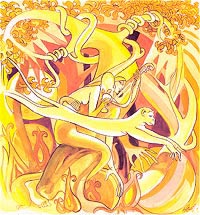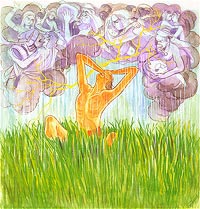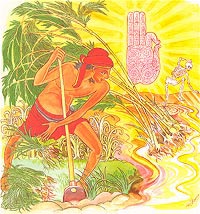8912 Saturday LESSON 695 - மூன்று கூடைகள் திபிதக![]() TIPITAKA from FREE ONLINE eNālāndā Research and Practice UNIVERSITY through http://sarvajan.ambedkar.org-
TIPITAKA from FREE ONLINE eNālāndā Research and Practice UNIVERSITY through http://sarvajan.ambedkar.org-
Dhammapada Verses 334, 335, 336 and 337 Kapilamaccha Vatthu-Verse 334. The Increase Of Craving-Verse 335. How Craving Increases-Verse 336. Escaping Craving-Verse 337. Uprooting Craving
 |
Verse 334. The Increase Of Craving
Explanation: Man’s craving grows like the creeper maluva. |
 |
Verse 335. How Craving Increases
Explanation: If some one is overcome by craving which is described |
 |
Verse 336. Escaping Craving
Explanation: Craving is a lowly urge. It is difficult to escape |
 |
Verse 337. Uprooting Craving
Explanation: All those here assembled, may you all be well. |
Dhammapada Verses 334, 335, 336 and 337
Kapilamaccha Vatthu
Manujassa pamattacarino
tanha vaddhati maluva viya
so plavati hura huram
phalamicchamva vanasmi vanaro.
Yam esa sahate jammi
tanha loke visattika
soka tassa pavaddhanti
abhivatthamva biranam.
Yo cetam sahate jammim
tanham loke duraccayam
soka tamha papatanti
udabindu va pokkhara.
Tam vo vadami bhaddam vo
yavante’ ttha samagata
tanhaya mulam khanatha
usiratthova biranam
ma vo nalamva sotova
maro bhanji punappunam.
Verse 334: In a man who is unmindful craving grows like a creeper. He runs
from birth to birth, like a monkey seeking fruits in the forest.
Verse 335: In this world, sorrow grows in one who is overwhelmed by this vile
craving that clings to the senses, just as well-watered birana grass grows
luxuriantly.
Verse 336: In this world, sorrow falls away from one who overcomes this vile
craving that is difficult to get rid of, just as water drops fall away from a
lotus leaf.
Verse 337: Therefore, I will deliver this worthy discourse to all of you who
have assembled here. Dig up the root of craving just as one who wishes to have
the fragrant root digs up the birana grass. Do not let Mara destroy you again
and again, as the flood destroys the reed.
The Story of Kapila the Fish
While residing at the Jetavana monastery, the Buddha uttered Verses (334),
(335), (336) and (337) of this book, with reference to a fish with a lovely,
golden colour and a stinking mouth.
During the time of Kassapa Buddha, there was a bhikkhu named Kapila, who was
very learned in the Pitakas. Because of his great learning he gained much
fame and fortune; he also became very conceited and was full of contempt for
other bhikkhus. When other bhikkhus pointed out to him, what was proper or not
proper he invariably retorted, “How much do you know?” implying that
he knew much more than those bhikkhus. In course of time, all good bhikkhus
shunned him and only the bad ones gathered round him. On one sabbath day, while
the bhikkhus were reciting the Fundamental Precepts for the bhikkhus (i.e., the Patimokkha)
Kapila said, “There is no such thing as Sutta, Abhidhamma, or
Vinaya. It makes no difference whether you have a chance to listen to the
Patimokkha or not, ” etc., and left the congregation of the bhikkhus.
Thus, Kapila was a hindrance to the development and growth of the Teaching (Sasana).
For this evil deed, Kapila had to suffer in niraya between the time of
Kassapa Buddha and Gotama Buddha. Later, he was reborn as a fish in the
Aciravati River. That fish, as mentioned above, had a very beautiful golden
body, but his mouth had a very horrid, offensive smell. One day, that fish was
caught by some fishermen, and because it was so beautiful, they took it in a
boat to the king. The king, in his turn took the fish to the Buddha. When the
fish opened its mouth, the horrid and offensive smell spread all around. The
king then asked the Buddha why such a beautiful fish should have such a horrid
and offensive smell. To the king and the audience, the Buddha explained, “O
king! During the time of Kassapa Buddha there was a very learned bhikkhu who
taught the Dhamma to others. Because of that good deed, when he was reborn in
another existence, even as a fish, he was endowed with a golden body. But that
bhikkhu was very greedy, proud and very contemptuous of others; he also
disregarded the Disciplines and abused other bhikkhus. For these evil deeds, he
was reborn in niraya, and now, he has become a beautiful fish with a mouth that
stinks.” The Buddha then turned to the fish and asked whether it knew
where it would be going in its next existence. The fish answered that it would
have to go again to niraya and it was filled with great despair. As predicted,
on its death the fish was reborn in niraya, to undergo another term of
continuous torment.
All those present hearing about the fish got alarmed. To then, the Buddha
gave a discourse on the benefits of combining learning with practice.
Then the Buddha spoke in verse as follows:
|
Verse 334: In a man who is unmindful craving grows |
|
Verse 335: In this world, sorrow grows in one who |
|
Verse 336: In this world, sorrow falls away from |
|
Verse 337: Therefore, I will deliver this worthy |